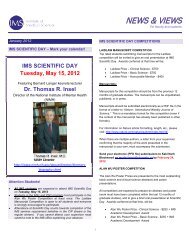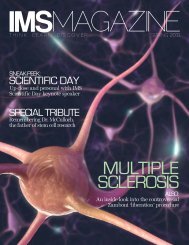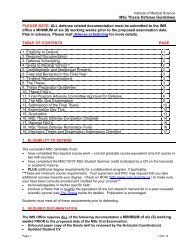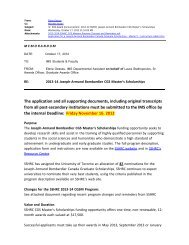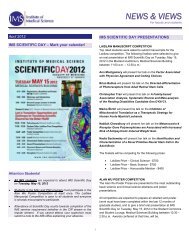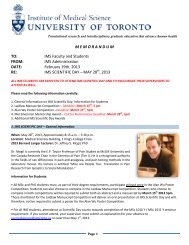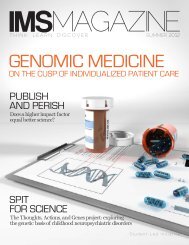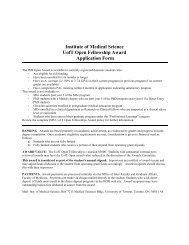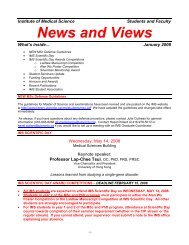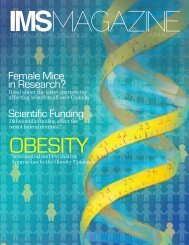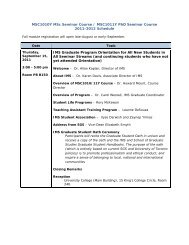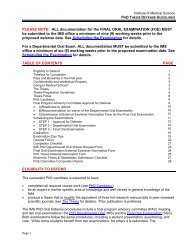Fall 2011 - Institute of Medical Science - University of Toronto
Fall 2011 - Institute of Medical Science - University of Toronto
Fall 2011 - Institute of Medical Science - University of Toronto
Create successful ePaper yourself
Turn your PDF publications into a flip-book with our unique Google optimized e-Paper software.
FUTURE DIRECTIONS<br />
terest in genetics and the brain. Following<br />
completion <strong>of</strong> his medical degree, his combined<br />
clinical and research interests led to<br />
a residency choice in psychiatry at the <strong>University</strong><br />
<strong>of</strong> <strong>Toronto</strong>. He recalls his rotation at<br />
the First Episode Schizophrenia Program at<br />
the Centre for Addiction and Mental Health<br />
(CAMH) as a third-year resident, and how<br />
this experience shaped his future research<br />
interest in schizophrenia as a brain disorder.<br />
During the fourth year <strong>of</strong> his residency training,<br />
he started his PhD with the IMS under<br />
the primary supervision <strong>of</strong> Dr. James Kennedy.<br />
A year later, he had the serendipitous opportunity<br />
to spend six months at the Harvard<br />
<strong>Medical</strong> School to learn about brain imaging<br />
techniques. This opportunity opened doors<br />
for fruitful collaborations as well as new ways<br />
to think about neuropsychiatry, leading Dr.<br />
Voineskos to go back to Boston later on during<br />
his PhD studies to continue learning<br />
about these cutting-edge techniques.<br />
Having started his graduate training in Dr.<br />
Kennedy’s neurogenetics laboratory, Dr.<br />
Voineskos has also done some work in PET<br />
imaging in the earlier days <strong>of</strong> his training.<br />
Under the mentorship <strong>of</strong> Dr. Martha Shenton<br />
at the Brigham and Women’s College at the<br />
Harvard <strong>Medical</strong> School, he gained vast experience<br />
working with diffusor tensor imaging<br />
(DTI), a more advanced MRI technique.<br />
DTI allows for the measurement <strong>of</strong> structural<br />
properties in different brain regions, which<br />
fits well with Dr. Voineskos’s passion for understanding<br />
how risk genes influence brain<br />
structures in patients with severe psychiatric<br />
disorders, particularly schizophrenia. He<br />
also credits the opportunities he had in the<br />
Geriatrics Program at CAMH for shaping<br />
his research scope. Being given a chance to<br />
work as a part <strong>of</strong> the team and be involved in<br />
data collection and scans led him to a whole<br />
different area <strong>of</strong> collaboration and research<br />
opportunities: recruitment <strong>of</strong> a healthy aging<br />
control cohort, as well as studying healthy<br />
aging and Alzheimer’s disease. His current<br />
research combines multi-modal neuroimaging<br />
and genetics approaches to map gene effects<br />
in the brain with the aim <strong>of</strong> discovering<br />
vulnerability pathways for severe mental illness.<br />
His research findings on the role <strong>of</strong> the<br />
BDNF gene in Alzheimer’s disease have been<br />
featured widely in the news media earlier this<br />
year.<br />
Dr. Voineskos recognizes the influence <strong>of</strong><br />
many mentors on this work and credits them<br />
greatly with where he is now as a scientist.<br />
He emphasizes the importance <strong>of</strong> the mentorship<br />
<strong>of</strong> Dr. Shenton at Harvard and Dr.<br />
Kennedy as his supervisors, and states that<br />
apart from research training, he has learned<br />
so much from them about how to get funding,<br />
grant writing, and the importance <strong>of</strong> networking.<br />
He also thanks Dr. Nancy Lobaugh,<br />
his clinical mentors Drs. Gary Remington<br />
and Jeff Daskalakis in the Schizophrenia Program<br />
at CAMH, as well as Drs. Bruce Pollock<br />
and Benoit Mulsant in the Geriatrics<br />
Program for their mentorship and support.<br />
Last but not least, he acknowledges the role<br />
IMS has played in his training and career.<br />
“I’d like to thank Dr. Mary Seeman for being<br />
flexible and allowing me to be away for my<br />
imaging training,” he says and continues, “the<br />
door was always open at the IMS, and the<br />
staff has been wonderful and very helpful in<br />
answering my questions on procedures and<br />
timeline.” Having delivered the very prestigious<br />
Salter-Siminovich lecture in the <strong>2011</strong><br />
IMS Scientific Day this May, Dr. Voineskos<br />
has always seen the Scientific Day as a great<br />
opportunity to exchange ideas and learning<br />
more about the research <strong>of</strong> his peers. He also<br />
recalls having enjoyed taking IMS courses,<br />
which gave him the chance to meet faculty,<br />
explore areas relevant to his research in an<br />
in-depth fashion, as well as publish highcaliber<br />
scientific papers resulting form his<br />
course work. As the Director <strong>of</strong> the Kimel<br />
Family Translational Imaging-Genetics Research<br />
Laboratory at CAMH, Dr. Voineskos<br />
is eager to pass his research experience to<br />
a new generation <strong>of</strong> research trainees: he is<br />
currently supervising two Master’s level IMS<br />
students and is looking forward to expanding<br />
his laboratory.<br />
One piece <strong>of</strong> advice Dr. Voineskos has for<br />
IMS students has undoubtedly shaped his<br />
young but stellar career, “having a great set <strong>of</strong><br />
mentors is at least as important as your specific<br />
research focus; keeping an open mind<br />
may open many doors for you in an unexpected<br />
fashion.” He highlights the benefits<br />
<strong>of</strong> learning as much as possible from each<br />
mentor and taking their best qualities to better<br />
yourself and your research skills. He also<br />
reminds the students the importance <strong>of</strong> hard<br />
work and staying motivated to succeed. Having<br />
been an avid participant in sports from<br />
a young age, he also emphasizes the importance<br />
<strong>of</strong> work-life balance.<br />
Indeed, this is not the typical career <strong>of</strong> a<br />
recent PhD graduate. At the age <strong>of</strong> 33, Dr.<br />
Voineskos has achieved success that many<br />
senior researchers have not had in their long<br />
careers. His stellar accomplishments surely<br />
are inspirational to graduate students interested<br />
in research as well as aspiring medical<br />
trainees and residents. Most importantly, the<br />
achievements <strong>of</strong> Dr. Voineskos serve as a testament<br />
to the importance <strong>of</strong> a solid research<br />
training, dedication, devotion, flexibility and<br />
eagerness to learn from others as the hallmarks<br />
<strong>of</strong> success and a fruitful research career.<br />
IMS MAGAZINE FALL <strong>2011</strong> PROSTATE CANCER | 38



